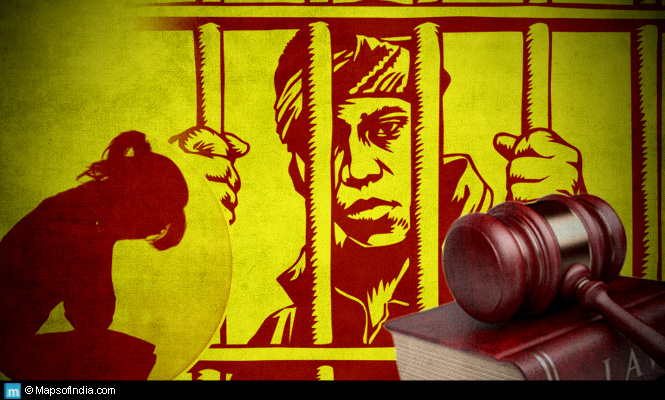 Crime committed by children under statutory age is known as juvenile delinquency. As per the statistics released by the National Crime Records Bureau (NCRB), juvenile criminals between 16 and 18 years accounted for more than 60% of the crimes registered against minors in India in 2013. In fact, the number of juveniles in conflict with law has increased by a significant number in recent times. This also included the modesty of women being outraged.
Crime committed by children under statutory age is known as juvenile delinquency. As per the statistics released by the National Crime Records Bureau (NCRB), juvenile criminals between 16 and 18 years accounted for more than 60% of the crimes registered against minors in India in 2013. In fact, the number of juveniles in conflict with law has increased by a significant number in recent times. This also included the modesty of women being outraged.
Keeping in mind the increase in crimes committed by juveniles, the Union Cabinet has approved an amendment to the Juvenile Justice (Care and Protection of Children) Act, 2000, to treat minors older than 16 years as adults, if charged with serious crimes such as rape. However, these delinquent youths shall not be given death or life sentence.
Debatable issues of the new law
The issue of how juveniles should be punished has come to the fore especially because of two cases that came to the limelight; the 2012 rape case in Delhi and the Shakti Mills rape case. Shockingly, in both the cases, one of the main accused was a juvenile. While the accused adult offenders were given the death sentence, these juveniles got away with just three years in a remand home. The questions that come to mind is, is this punishment enough to rectify a youth; what kind of punishment should be given to such culpable youths for optimum positive results in changing the criminal characteristics and reforming them?
Many Indians are of the school of thought that these juveniles should also be dealt with an iron fist, and the most severe punishment possible, meted out to them. They believe that the child in question should be sent to jail immediately through the court system, bypassing the Juvenile Justice Board.
Some, including the child protection activists, believe that the Government is succumbing to mob pressure in making the law where in juveniles above the age of 16 shall be treated as adults if charged with a serious crime. They feel that the JJ Act is based on the principle of reformative justice and not on retributive justice. The Government, according to them, should rely on expert opinion and not be swayed by popular sentiment. According to Anant Kumar Ashtana, a lawyer in the Delhi High Court, “by suggesting change in the juvenile justice system the Government has not done justice.” He further adds that “the new juvenile law will not reform a juvenile but school him in crime. It is a serious deviation from the system of ‘parens patriae’, a doctrine that believes that the State is the parent of the nation.”
Maneka Gandhi, Union Minister for Women and Child Development, has pointed out that there have been three schools of thought as to how to treat derelict blameworthy youths. The first one believes the age should not be reduced; the second group felt that the Government should not be vested with the power to condemn the child immediately; while the third, overwhelmingly majority of people, believe that the delinquent juvenile should be treated as an adult and sent to jail. Maneka Gandhi says that the Union Cabinet has taken into consideration the feedback of all the three schools of thought, and chosen a middle path, wherein the Government has no right to interfere and the child is treated as an adult based on recommendation from the JJ board after scrutiny. She feels that the JJ board is a competent authority to judge, as it consists of the best psychologists and experts.
Causes of juvenile delinquency
There are many factors contributing towards the criminal nature of the youth. Most of these youths come from families of discord or abuse. Peer pressure, neighbourhood also influence the development of a child. Poverty is also one of the main causes for a delinquent youth. Although education plays an important role in moulding the future citizens, the system somewhere lacks in the ability of holding the attention of non-bookish and non-academic individuals and thus contributes towards many cases of juvenile delinquency. Delinquents are typically those who take studies like a burden and on being rebuked turn towards crime. There are some measures which may help in reforming these children:
- Instil in them a sense of security and give them the love and affection that they may have been deprived of.
- Parents should be counselled to detect early signs of maladjustments, so that any tendency towards delinquency may be destroyed at the roots.
- A sense of moral and social values should be instilled in them at the very beginning.
- Bring about a change in the community that encourages such behaviour.
- Schools should adopt the option of skill management and vocational training, so that children who are not academic by nature have the option of developing a skill which will give them the opportunity to earn a livelihood even without formal education.
- Once a delinquent behaviour has been detected, one must remember to reject the behaviour and not the individual.
The Prime Minister, Narendra Modi, in his Independence speech last year encouraged the parents to take account of their children. He has said, “My dear brothers and sisters, the law will take its own course, strict action will be taken, but as a member of the society, as parents, we also have some responsibilities.”
Conclusion
It is rightly said that a child is the father of the man. Whatever qualities are imbibed in a child, will stay with it till the end. With good qualities, we have good future citizens, and the vice versa. Undoubtedly, every delinquent youth is a victim of circumstance. No human is ever born bad or wrong. So it is the duty of every citizen of India, as parents, teachers, relatives, friends, to guide the future generation of India into the right path. It is important to remove the bad from the individual and not the individual.
It’s time for a better tomorrow.




